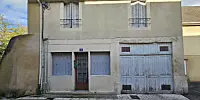-
Flat owner on hunger strike over non-paying tenants in south of France
‘I’m starting to feel a bit shaky’ says owner. The tenants say they cannot move out
-
Interest rates for loans to buy property in France continue to fall
The drop may help kickstart the market as banks and politicians explore new ways to boost home sales
-
French town is selling house for €1
However there are conditions and buyers will have to spend considerably more on renovations
Know your options and the rules for mortgages
Taking a mortgage to buy a property in France is similar, but different, from doing the same in the UK and you should be aware of differences in loan rates and insurance. An expert answers some of readers’ more common questions
Can I release equity in my house to do some home improvements?
When you apply for a mortgage to buy a property you can apply for extra to carry out home improvements. When the mortgage starts, the amount sent to the notaire will be without the funds for the work.
Once you have a signed receipt/facture to show that the work has been carried out then you submit this to the bank. They will then release the funds (called déblocage).
Your monthly mortgage payment will increase proportionally from that point (and until the whole mortgage is paid off).
You generally have three years to draw the extra funds you requested. After the three years the availability of the funds falls away. You only ever pay for the amount you have actually borrowed.
If you want to do home improvements to your home after the purchase, you can apply for a loan. It is unlikely that this will be linked to your home, it will be a personal loan.
However, the pricing structure of personal loans is different depending on what you are borrowing for.
For example the rate for home improvements will be much lower than the rate for buying a new TV.
Do I have to take a mortgage through my bank?
You do not have to apply for a mortgage with the bank you already have an account with.
If you apply to a different bank you will need to supply three months’ bank statements to show to the new bank.
Most banks ask you to pay your salary/income into an account with them and for the mortgage payment to be taken from there.
What do mortgage brokers do and how are they paid?
A mortgage broker can compare rates of several banks rates easily. You can ask for a list of banks your broker has an agreement with as not all brokers will cover every bank. The lender will pay a percentage of the mortgage amount to the broker and the broker may also charge a fee to the client.
We have the funds to buy a house in France outright, but would you advise keeping the money in the bank and taking a mortgage?
It depends on your circumstances, but if you buy a property and use your funds then you can leave yourself with a shortfall if you are faced with repairs to your property etc.
If you have enough cash to purchase the property outright then an alternative is to take a mortgage and invest your money in an assurance vie.
For example, if you borrow €100,000 at 1.5% and invest €100,000 in an assurance vie with an average rate of 2.5%, you are earning 1% more on your money than you are paying out. When you use the funds to pay off the mortgage you are left with the profit.
Can I borrow more than three times my income? What income multipliers does France use?
Affordability is based on your income. Your mortgage and other loan commitments should be no more than one-third of your income.
You also need to consider the ‘reste à vivre’ which is the minimum amount to live on, after you have paid your mortgage and loans.
This means the 33% of your income criteria could be higher or lower, depending on your circumstances.
Do I need to know my credit score before I apply for a mortgage?
There is no credit scoring in France when you apply for a mortgage. The application is considered on set criteria and on an individual basis.
I have heard of a 0% mortgage, is that true?
It is possible to obtain some of a mortgage at 0% however, you need to meet the criteria set.
The 0% loan is called PTZ (prêt à taux zéro) and is a state-assisted loan.
The amount you can borrow is means tested and depends on certain criteria – your income, your family circumstances and the area where you wish to purchase. You must not have owned a main home in France in the last two years.
The purchase must be a new property, or an older property that needs work carrying out.
I am the director of my own Limited Company in the UK. I can work from home, so I live in France. However, my bank will not give me a mortgage because my income is from abroad.
If your income is from outside France, you will often find it difficult to obtain a mortgage. Some providers will consider foreign income. An AXA spokesperson, for example, said they can refer people who cannot take a mortgage with them due to overseas income to a lender who will consider it.
I have been self-employed for two years, but I’m finding it hard to find a bank that will give me a mortgage.
It is difficult to obtain a mortgage in France until you have been self-employed for three years. There are some exceptions, for example, if you have been self-employed in another country doing the same activity you may be accepted as you can show more than three years’ experience and income.
Do I need to re-fix my rate every two or five years?
A fixed-rate mortgage in France means the rate is fixed for the whole term: a 25-year mortgage has the rate fixed for 25 years etc. The shorter the term, the lower the fixed rate so if you and a friend both applied to the same bank for a mortgage, you for a 20-year term and your friend over 10 years, your friend would have a lower rate than you.
I thought the bank did not ask for a survey when you buy a house in France, so why did I have to have one done?
If you are classed as an international buyer, then the process is somewhere between the UK and the French system. You will need to put down a larger deposit, usually 15% to 25%, the bank will insist on a survey to set the loan to value and the minimum mortgage amount is usually €75,000.
This means that finding a bargain home under €100,000 means you will struggle to find a mortgage!
What is the maximum loan-to-value I can borrow?
The mortgage system in France does not use the loan-to-value ratio. You should aim to have a deposit that is enough to cover the notaire fees, the bank application fee, and the guarantee fee.
We are renting but want to buy land to build our own house. We cannot afford to pay rent and mortgage: how do people manage it?
When you want to build your own home, or are buying from a developer there are a few options that will help you:
- You do not have to make any mortgage repayments until you move in. The interest builds up on the mortgage amount you have borrowed, so when you do start to repay the mortgage as you move in you will owe more than you originally borrowed (the start amount plus built-up interest).
- You can make monthly payments to the mortgage to cover the interest due each month. When you move in and start the mortgage repayments then the balance will be the same as the starting amount owed.
- You can start full payments, capital and interest, straight away. Your mortgage will be drawn in a few stages so the amount you owe up to when your new house/flat is built will increase in stages.
I own my home in France but would like to buy a house in the UK as I may move back later. Can I arrange finance in France?
If you own your French home outright some lenders can release equity in the property, up to 75% of current value (minimum €75,000). You can use these funds to buy a property in the UK, or any European country.
If I have a fixed rate with 20 years left do I have to stay with that lender or can I remortgage?
You are free to remortgage at any time. You will usually pay penalties to come out of your current mortgage, depending on the type of mortgage.
Your new lender will help you to establish how much you will pay for any redemption penalties and calculate the potential savings you will make.
Non-resident queries
I do not live or work in France but I want to buy a holiday home there.
Can I get a mortgage?
If you continue to live outside of France then the mortgage process is different. Lenders will look at existing mortgages and credit in your home country. They will require you to put down a deposit of at least 25% of the purchase price, plus have the funds to pay notaire fees. If you do not live in France then the minimum mortgage amount is €75,000.
I bought my holiday home without a mortgage but I’d like to add a pool and a new kitchen. I don’t want to use savings so what can I do?
If you do not have a mortgage on your holiday home you can take a home improvement loan by releasing the equity in your house. The minimum amount is €75,000, and is dependent on the loan-to-value against your property value and affordability.
Answers compiled with the help of Axa Agence International, a dedicated English-speaking agency www.axa-in-france.fr
























